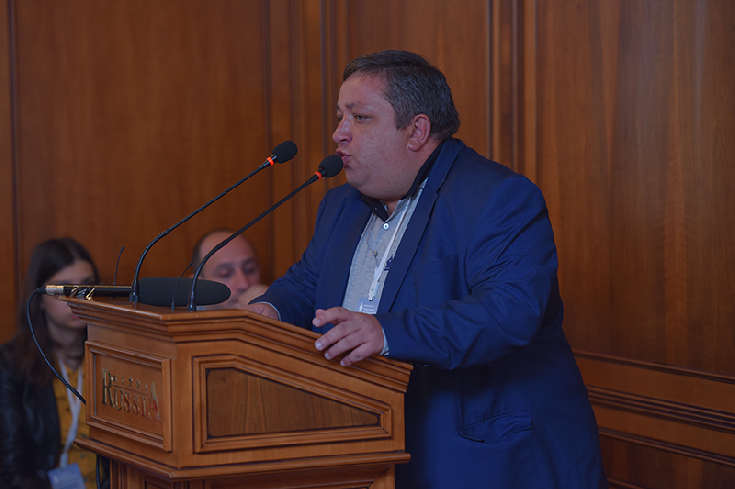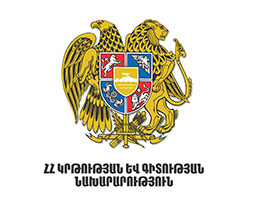
 ChessAcademy.am
ChessAcademy.am
Perspective on the Studies Conducted in "Chess Education Research Center" from Research Group Leader, Psychologist Vahan Sargsyan
Since 2014, associate professor at the Armenian State Pedagogical University, Vahan Sargsyan, has been conducting research on the influence that learning chess has on junior schoolchildren. In cooperation with the Chess Academy of Armenia, he began his research immediately following the “Chess in Schools” conference held in Yerevan the same year. Prof. Sargsyan spoke to us about research in the study of inclusive education, conducted by the psychologists and sociologists of the “Chess Education Research Center”, as well as from Sargsyan himself.
Ani Khudoyan and Anna Charchyan were two of the researchers working under Prof. Sargsyan who dealt with the issues of inclusive education. They have since presented studies discussing the impact of chess on children with special educational needs, particularly on their self-confidence and communication. Close attention was also paid towards monitoring the effectiveness of chess lessons involving children with special needs. Khudoyan and Charchyan believe this demonstrates that chess can successfully be taught in the framework of inclusive education - despite the existing prejudice that only intellectuals can play chess. Meanwhile, another team of sociologists consisting of Christina Tanajyan, Nelly Melkonyan and Nune Gevorgyan were occupied with surveying public and intramural attitudes towards chess. According to their research and the completed questionnaires it became clear that chess is among the pupils’ favorite subjects after Armenian language and mathematics.
Another group of psychologists (Anzhela Sargsyan, Armine Khachatryan) performed studies - mainly of a psycho-physiological nature - the results of which have outlined how chess affects different mental processes such as memory and decision making.As the research group leader, Prof. Sargsyan compared the results of the surveys carried out by his researchers with earlier research of his own, that reflected the situation in Armenia. Consequently, a test was developed as a result that measured the abilities of pupils studying chess. The data obtained from the test was sorted against a number of parameters, including the attitude of the parents towards chess, the students’ level of education, and the methods and approaches utilized by the teachers during the teaching process. Having identified the factors most closely tied to a successful learning experience with chess, Prof. Sargsyan presented the results of this study at international conferences held in Tsaghkadzor, Armenia, and Batumi, Georgia. The findings of this study will be of vital essence as the Chess in Schools program continues to thrive in Armenia. Sargsyan notes that the identification of these factors is crucial for monitoring teachers within the program, and for launching new activities that target the parents of junior schoolchildren and their standing perceptions of the chess education program. He also hopes that the survey will be of value to our international colleagues who have participated in the international conferences and are planning to include chess in the school curriculum.
Prof. Sargsyan underlines the fact that we have only made the first step by involving chess in the primary school curriculum, and that in order to give general conclusions about the impact of chess on a child's psychological development, there is still much to be done. Several factors remain that can influence the effectiveness of chess teaching, and while competency of the teacher is clearly important; the provision of training materials, the appropriate employment of teaching techniques and methods, the motivation of the schoolchildren’s parents, and finally the general attitudes of the pupils towards chess are all key elements that can promote or hinder the teaching of chess in schools. A considerable amount of work remains to be done to study the impact of each of these factors, and Prof. Sargsyan maintains the importance of international cooperation with acclaimed cognitivists, psychologists, and sociologists in order to achieve this goal. In particular, a vast amount of material has been accumulated in the Chess Education Research Center, which, once rigorously sorted and examined, can further reveal the educational potential of chess.
Talking about some of the more controversial problems found in chess textbooks, Sargsyan notes that his research shows that there is a need to update these problem-solving activities in line with contemporary pedagogical principles. However, Prof. Sargsyan also emphasized the importance of the fact that the textbook and the teacher should not be viewed as discrete phenomena, but as parts of a single system. Thus, Prof. Sargsyan notes, complex and advanced concepts in the chess textbooks should be conveyed to pupils by teachers of a sufficiently high caliber. Naturally, the training of teachers to the level of proficiency required takes several years, and in this regard, the Bachelor’s degree program that will be launched in the Armenian State Pedagogical University (ASPU) from the 2017-18 academic year onwards, may be the catalyst needed to train highly qualified professionals for teaching positions across the country. Prof. Sargsyan, who has long been engaged in competency modeling studies, mentions on. He also notes that he has always been proud to represent Armenia in international forums, especially as Armenia’s experience in this field is regarded as unique. Sargsyan stresses that this status quo reinforces the responsibility of engaging in a field of research that is so quickly gaining momentum in Armenia and abroad.
By Tatev Khachatryan





